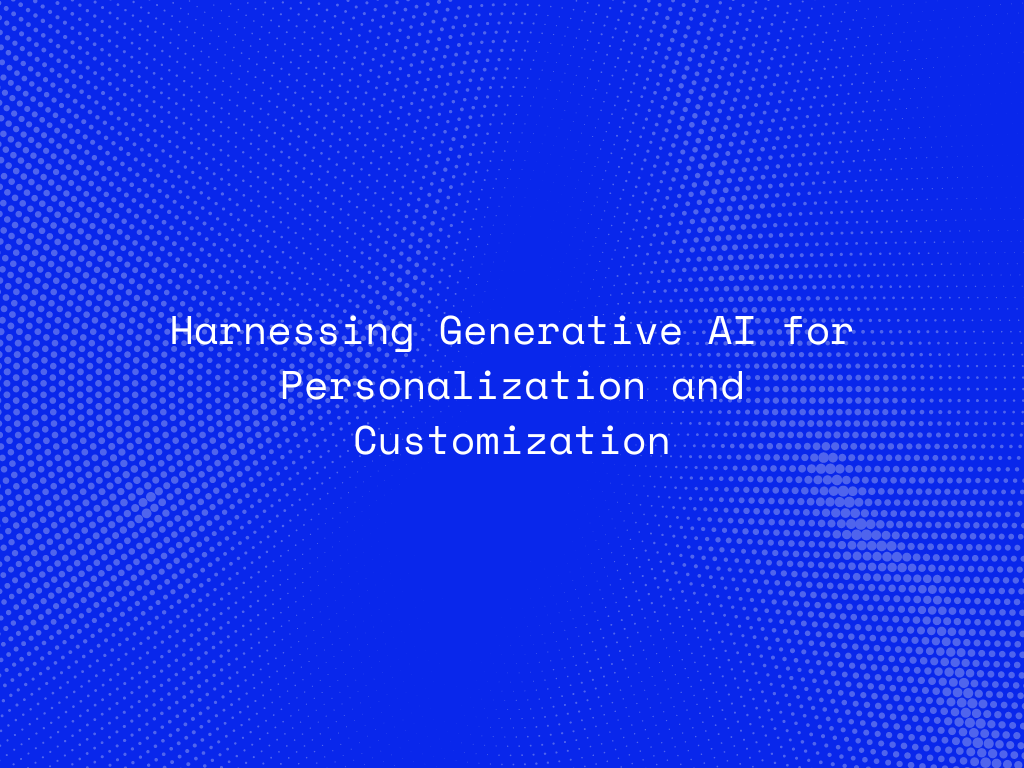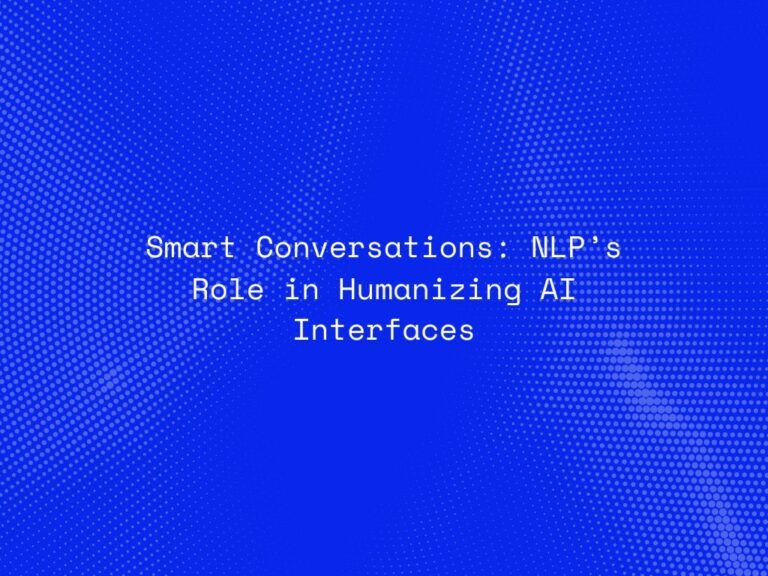In today’s digital age, consumers expect personalized experiences that cater to their unique preferences and needs. Businesses that can deliver these tailored experiences often enjoy higher customer satisfaction, loyalty, and conversion rates. One of the most powerful tools enabling this level of personalization is generative AI. By leveraging advanced algorithms and models, generative AI can create highly customized content, products, and services that resonate deeply with individual users. In this blog, we’ll explore how generative AI is being harnessed for personalization and customization across various industries, and how businesses can effectively implement these technologies to stay ahead in a competitive market.
The Power of Personalization
Personalization refers to the process of tailoring content, products, or services to meet the specific needs and preferences of individual users. This approach contrasts with the one-size-fits-all model, where the same content or offering is presented to all users. Personalization can take many forms, from recommending products based on past purchases to customizing user interfaces based on behavior and preferences.
The benefits of personalization are well-documented:
-
Increased Engagement: Personalized content is more relevant to users, which can lead to higher levels of engagement, whether it’s in the form of longer website visits, more frequent interactions with an app, or increased social media activity.
-
Higher Conversion Rates: By presenting users with content or products that align with their interests, businesses can significantly increase conversion rates, whether that means making a purchase, signing up for a service, or completing another desired action.
-
Improved Customer Loyalty: Personalization can help build stronger relationships with customers by making them feel understood and valued. This can lead to higher levels of customer retention and brand loyalty.
What is Generative AI?
Generative AI refers to a class of AI algorithms that can create new data or content based on existing data. Unlike traditional AI models that focus on prediction and classification, generative AI models are designed to generate original content that is similar to the data they were trained on. This can include generating images, text, music, or even entire user experiences.
Generative AI models include techniques such as:
- Generative Adversarial Networks (GANs): Used for generating realistic images, videos, and other visual content.
- Variational Autoencoders (VAEs): Employed for creating new data points by learning the underlying distribution of the training data.
- Transformers: Used in natural language processing (NLP) to generate text, such as chatbots, summaries, and even creative writing.
Connect With Us
Applications of Generative AI in Personalization and Customization
Generative AI is transforming how businesses approach personalization by enabling the creation of highly customized experiences across various domains:
-
E-Commerce and Retail:
- Product Recommendations: Generative AI can analyze a user’s browsing history, past purchases, and preferences to generate highly relevant product recommendations. This goes beyond simple matching to create personalized shopping experiences that feel uniquely tailored to each customer.
- Custom Product Design: Some companies are using generative AI to allow customers to design their own products, such as shoes, clothing, or home decor items. By inputting their preferences, customers can generate unique product designs that are then manufactured on-demand.
- Dynamic Pricing: Generative AI can also be used to create personalized pricing strategies, offering discounts or special offers based on a user’s behavior, loyalty, or purchase history.
-
Content Creation:
- Personalized Marketing: Generative AI can create customized marketing content, such as emails, ads, and social media posts, that resonate with individual users. By analyzing user data, AI can generate content that is more likely to capture the user’s attention and drive engagement.
- Dynamic Web Content: Websites can use generative AI to dynamically generate content that adapts to each visitor’s preferences. For example, a news website could present different headlines or stories based on a user’s reading history and interests.
- AI-Generated Media: Generative AI is also being used to create personalized media content, such as videos or music. This can include personalized playlists, video recommendations, or even AI-generated music tracks tailored to a user’s taste.
-
Healthcare:
- Personalized Treatment Plans: In healthcare, generative AI can analyze patient data to create personalized treatment plans. This could involve generating customized exercise routines, dietary plans, or medication schedules based on an individual’s health data and genetic information.
- Custom Medical Devices: Generative AI can also be used to design custom medical devices, such as prosthetics or orthotics, that are tailored to a patient’s unique anatomy.
-
Entertainment:
- Interactive Storytelling: In gaming and entertainment, generative AI can create personalized storylines or game environments that adapt to a player’s choices and preferences. This leads to more immersive and engaging experiences.
- Personalized Media Recommendations: Streaming platforms are using generative AI to analyze viewing habits and generate personalized movie and show recommendations. This ensures that users are presented with content that aligns with their tastes, keeping them engaged on the platform.
-
Education:
- Custom Learning Paths: In education, generative AI can create personalized learning paths for students. By analyzing a student’s performance, learning style, and preferences, AI can generate custom lessons, exercises, and study plans that optimize the learning experience.
- AI Tutors: AI-powered tutors can generate personalized feedback and support for students, adapting to their individual needs and helping them overcome specific challenges.
Connect With Us
Challenges and Ethical Considerations
While generative AI offers tremendous potential for personalization and customization, it also presents certain challenges and ethical considerations:
-
Data Privacy:
- Personalization relies heavily on user data, raising concerns about data privacy and security. Businesses must ensure that they handle user data responsibly, adhering to regulations such as GDPR, and being transparent about how data is used.
-
Bias and Fairness:
- Generative AI models can inadvertently perpetuate biases present in the training data. This can lead to biased or unfair personalization, where certain groups of users receive different treatment based on characteristics such as gender, race, or age. It’s crucial to implement fairness checks and ensure that AI-generated content is equitable for all users.
-
Transparency:
- Users may not always be aware that they are interacting with AI-generated content. Ensuring transparency and allowing users to understand how their experiences are being personalized by AI is important for building trust.
-
Over-Personalization:
- There is a risk of over-personalization, where users feel that their experiences are too tailored, leading to a sense of being overly monitored or manipulated. Striking the right balance between personalization and respecting user autonomy is key.
-
Ethical Use of AI:
- As generative AI becomes more powerful, ethical considerations around its use become more prominent. Businesses must ensure that they use AI responsibly, avoiding practices that could be perceived as manipulative or intrusive.
How to Harness Generative AI for Personalization and Customization
To effectively leverage generative AI for personalization and customization, businesses should consider the following steps:
-
Understand Your Audience:
- The first step in personalization is to deeply understand your audience. Collect and analyze data on user behavior, preferences, and demographics to build a comprehensive profile of your customers.
-
Choose the Right AI Models:
- Different generative AI models are suited to different tasks. Select the models that align with your personalization goals, whether it’s GANs for image generation, transformers for text generation, or VAEs for creating new data points.
-
Integrate AI into Existing Workflows:
- Incorporate generative AI into your existing workflows to enhance personalization. This could involve integrating AI into your e-commerce platform, content management system, or customer relationship management (CRM) tools.
-
Ensure Data Privacy and Security:
- Protect user data by implementing robust data privacy and security measures. Be transparent with users about how their data is being used and provide options for them to control their data.
-
Monitor and Optimize:
- Continuously monitor the performance of your AI-driven personalization efforts. Use feedback and data to refine your models and strategies, ensuring that they continue to meet user expectations and business goals.
-
Ethical AI Practices:
- Establish ethical guidelines for the use of AI in personalization. Ensure that your AI models are fair, transparent, and aligned with your brand values.
Connect With Us
Conclusion
Generative AI is a powerful tool that enables businesses to create highly personalized and customized experiences for their customers. By understanding and implementing these advanced techniques, companies can better meet the needs of their audience, enhance customer satisfaction, and gain a competitive edge in the market. However, it’s essential to approach generative AI with a focus on ethics, fairness, and transparency, ensuring that the technology is used responsibly and for the benefit of all users. As generative AI continues to evolve, its potential for personalization and customization will only grow, opening up new possibilities for innovation and creativity across industries.




